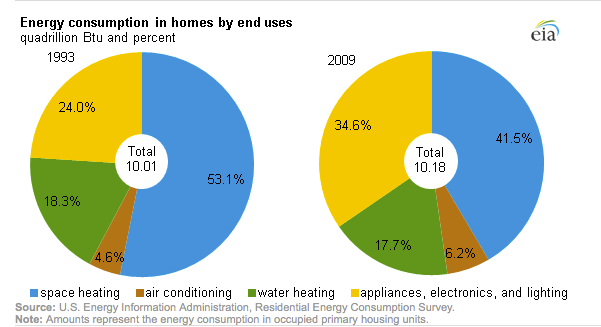This question originally appeared on Quora.
Answer by Ryan Carlyle, BSChE, subsea hydraulics engineer:
To know where you can recapture energy, you have to look at where the energy is being used:

Courtesy of U.S. Energy Information Administration
Obviously, heating and cooling is two-thirds of all energy use, so home insulation is hugely important. It’s better to not waste energy than to recapture wasted energy. So that’s the first place to start.
An important point to make here is that almost all “appliance, electronics, and lighting” energy use turns into heat after the appliance is done with it. Your oven heats your house while cooking food, and light bulbs heat your house while making light.
Same goes for everything else:
- Computer? Heats your house.
- Vacuum cleaner? Heats your house.
- Refrigerator? Heats your house.
- Blender? Heats your house.
All energy eventually turns into heat when you’re done using it. That’s how entropy works. So from a big-picture point of view, the only thing that matters for energy efficiency is heat management in some form or another. If you’re heating or cooling, it’s obviously all about heat. But even when you’re talking about appliances, it’s all about how much heat they produce while doing the relevant work. (Energy-efficient light bulbs and refrigerators save energy solely by producing less heat to accomplish the same objective.)
Anyway, back to the subject at hand. Let’s assume your house is well-insulated. Where are the energy flows that might be harnessed? In order of magnitude:
- Flow of heat into or out from the building
- Flow of heat from appliances, electronics, and lighting into the building
- Flow of heat from hot water down the drain
At a big-picture level—energy flows of more than roughly 1 percent—that’s all. There are no other major energy flows in 99 percent of homes that can be reused. I can certainly think of a bunch of trivial, stupid energy-capture techniques, but they physically can’t produce enough power to be worthwhile. Examples of bad ideas include:
- Regenerative braking on washing machine spin cycle
- Turbine generators in your faucets or shower heads to make electricity from utility water pressure
- Seebeck effect couplers lining your oven to turn some of the waste heat to electricity
All really stupid ideas. Don’t bother with little stuff like this. It doesn’t pay off.
So the question of home energy reuse really boils down to: How do I make heating/cooling flows pay double dividends or avoid using double energy?
Perfect example of paying for the same thing twice: air conditioning. The average U.S. household consumes an average of 450 watts of electricity on “appliances, electronics, and lighting” at all times. Your appliances, in aggregate, are the equivalent of a space heater set on “low.” And your water heater puts off heat directly and throughout your walls by way of the plumbing. All that heat has to be removed from your home by your air conditioner. That’s a classic example of paying twice. Figuring out a way to route that heat directly outside (bypassing the AC) or toward something useful would save a lot of energy.
An example might include using a central vacuum system that routes hot exhaust air outside. Or perhaps running the feed inlet to your water heater through a heat exchanger tied to your refrigerator coils. Send the appliance heat directly where you want it.
Likewise, the AC pushes a lot of heat outside your house. But your water heater needs heat, year-round. A hybrid air conditioner/water heater unit will make hot water while it cools your house! Double dividend. This is a real thing you can buy. Managing the air conditioning can reuse or save a lot of energy.
On the other hand, in winter, maybe you want all that appliance-generated heat. You’re already paying to run the appliances, so the heat is effectively free. So you don’t always want the heat to go outside. In that case, the heat isn’t wasted—it’s working for you twice.
One of the things I wish I could do is recover heat from hot water. When your house is cold, dumping 40 gallons of hot water down the shower drain every morning is an idiotic waste of energy. That hot water should be warming your house, not the sewers. Maybe you could use the warm drain water to preheat the cold water feed to your water heater. (This has actually been done before.)
There are other possible ideas. But all major residential energy reuse opportunities revolve around heat-flow management. Everything else is pretty trivial compared to heating and cooling.
More questions on Sustainable Technology: